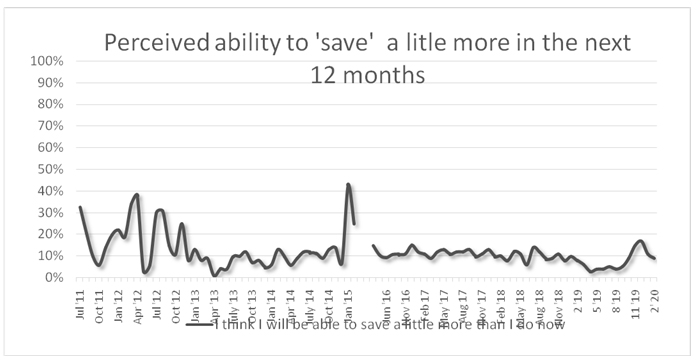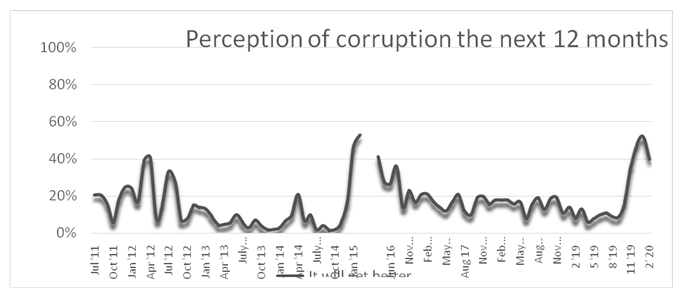April, 28, 2020

Perceived Economic Opportunity Index: January - March 2020
Given the onset of Covid19 all research activity sized middle of March 2020 with the whole country going in to a lockdown and subsequently a nationwide curfew. Therefore, data for Quarter 1 for 2020 is restricted to January and February.
Methodology
The PEOI is calculated based on data collected on an island-wide random survey of 500 persons based on face-to-face interviews.
Presentation of Findings
We have experimented with presentation of the findings of the survey over the years since we initiated the study in July 2011 and settled on highlighting the share of respondents who perceive their economic opportunities would get better in the coming 12 months in comparison to the present. Answers to a couple of other selected questions (from eleven we pose to the respondents) are regularly presented while others we do whenever we see fit.
Perceived Economic Opportunity
The question posed to the respondents is if they believe their opportunities, be it in the workplace or in their business would increase, stay the same or diminish.

The November 16, 2019 election that brought President Gotabaya Rajapaksa to power saw an immediate rise in the sentiments of the people. Those who perceived their economic opportunity to improve hit a high of 23 percent in December 2019 as opposed to just 9 percent in October 2019. However, this expectation was short lived. Having stayed the same at 22 percent in January 2020, it declined to 12 percent by February 2020. At the same time those who perceived their economic fortunes to decline had fallen to a low of 29 and rose to 30 and 41 percent respectively in the months of December 2019, January 2020 and February 2020.This however is still low compared to the mid 60 percent figures for several months before the election indicating the disappointment of the general public about their economic opportunity.
The post-2019 presidential election high at 23 percent was however significantly lower than the post-2015 figure at 40 percent indicating a much higher expectation at the previous election. This finding was unexpected given the hype around the election and the public persona of the newly elected President as a capable person with an intellectual team.
By February 2020, the expectations seem to have dissipated by a fair amount, falling to just 12 percent, with the general population resigning to the belief of nothing very much would happen in terms of their own economic opportunity. But it does corroborate the lack of expectations relative to the previous change of the Presidency. Perhaps the inability to deliver last time may have subdued the expectations this time around, or the public may not have expected the change in government to reverse the trend that easily. It could also be that the public felt the transition was incomplete with the general elections still to be held at which the President would be able to obtain a majority in Parliament. We would be able to figure out the reasons for this behavioral pattern as the surveys progress.
Perception on Ability to Save
Here our objective is to determine the perception on saving. Having obtained their views on cost of living and ability to save some of what they earn, we ask the respondents on what they think will happen to their savings in the coming 12 months.

The perception on the public’s ability to save a ‘little more’ than what they do at present also increased after the election of the new President to 17 percent from just 5 percent two months prior, but soon dissipated to 11 and 9 percent respectively by February 2020. This feeling is in line with the rise and fall of their perceived opportunities.
Perception on Corruption
Every day, people complain about corruption from the highest to the lowest person of authority. Whether factual or not the perception of corruption is high. The question posed is if the respondents perceive that corruption will lessen in the coming 12 months

As was the case in January 2015 presidential election, this time too the public in general expected corruption to fall and the percentage who said so increased from just 9 percent two months before the election to 48 percent soon after. The figure in fact rise to 52 percent in January but by February 2020, expectation had fallen to 40 percent. Yet, unlike in the previous instances of economic opportunity and ability to save, people seem to still have hope for a less corrupt society. We shall observe the dynamics of this variable in the coming months.
Concluding Thoughts
The general perception of the public about their future as captured by the two questions on economic opportunity and ability to save reflect a positive surge with the election of President Gotabaya Rajapaksa. However, that sense of positivity seems to have been short-lived with expectations falling to levels just above what was witnessed before the election in only a matter of three months. We would see how these sentiments would behave with the unprecedented economic slowdown and loss of employment with the Covid19 related lockdown that prevailed from mid-March to Mid-May in some form or the other in coming assessments. Policy makers can certainly use the perceptions identified and tracked in this unique study we have been conducting monthly since July 2011 to either develop or fine-tune their policies.
The Perceived Economic Opportunity was developed and is measured by the Foundation for Economic Freedom in Sri Lanka (FEF) in partnership with Friedrich Naumann Stiftung Fur Die Freiheit.
Video Story